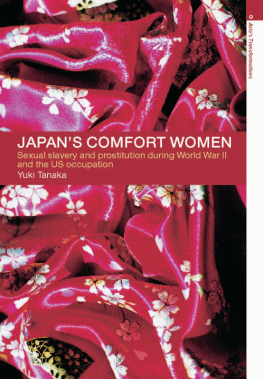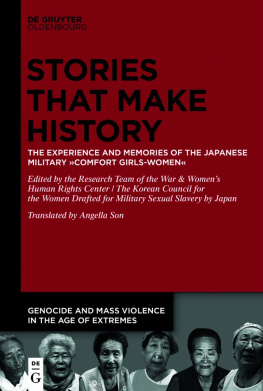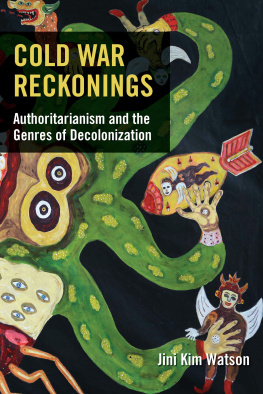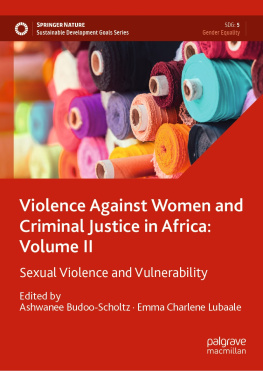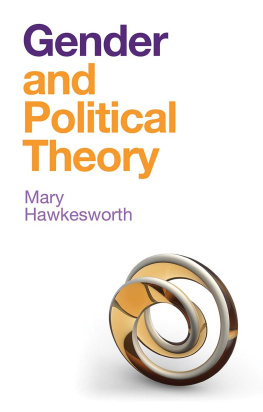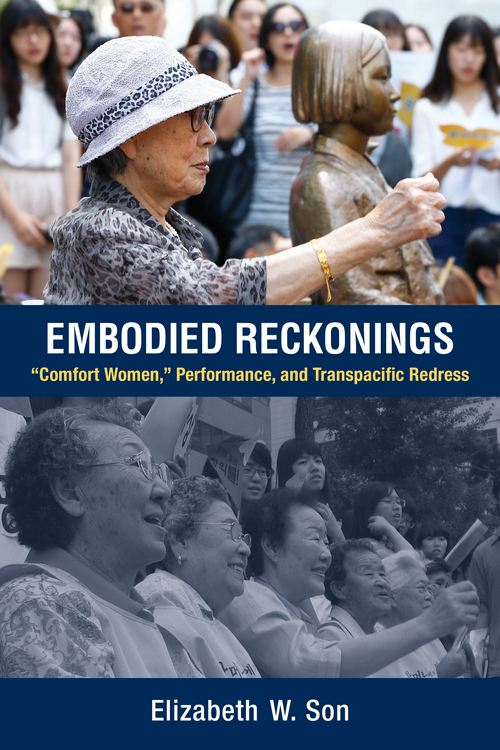
Embodied Reckonings
Embodied Reckonings
Comfort Women, Performance, and Transpacific Redress
Elizabeth W. Son
University of Michigan Press
Ann Arbor
Copyright 2018 by Elizabeth W. Son
All rights reserved
This book may not be reproduced, in whole or in part, including illustrations, in any form (beyond that copying permitted by Sections 107 and 108 of the U.S. Copyright Law and except by reviewers for the public press), without written permission from the publisher.
Published in the United States of America by the
University of Michigan Press
Manufactured in the United States of America
A CIP catalog record for this book is available from the British Library.
Library of Congress Cataloging-in-Publication data has been applied for.
ISBN: 978-0-472-13073-4 (hardcover : alk. paper)
ISBN: 978-0-472-03710-0 (paperback : alk. paper)
ISBN: 978-0-472-13073-3 (e-book)
All royalties earned from book sales will be donated to the Butterfly Fund, which was started by survivors Kim Bok Dong and Gil Won Ok to help female victims of sexual violence during armed conflicts. https://www.womenandwar.net
Cover: (top) Survivor Kim Bok Dong at the Wednesday Demonstration on September 10, 2014, in Seoul. She sits a few feet from a realistically rendered bronze statue of an adolescent girl that was installed in 2011 to commemorate the Wednesday Demonstrations and honor survivors. Credit: Yonhap via Newscom/ZUMA; (bottom) Survivors (left to right) Gil Won Ok, Kim Soon-ok, Lee Yong Soo, Park Ok-sun, Yi Ok-seon, and Bae Chun-hui at the Wednesday Demonstration on July 23, 2008 in Seoul. Photo by Elizabeth W. Son.
For my mother, Eun Hie Paik, and father, Hun Bae Son
Contents
I have lived with this project for ten years. It has traveled with me from New Haven to Seoul, Tokyo, and countless cities across the United States. I could not have made it through this journey without so many people by my side.
First, I am indebted to the brave women whose stories are at the heart of this book. I feel so fortunate to have protested alongside Bae Chun-hui, Gil Won Ok, Kang Il-chul, Kim Bok Dong, Kim Soon-ok, Lee Mak Dal, Lee Soon-duk, Lee Yong Soo, Park Ok-sun, and Yi Ok-seon. Gil Won Ok, Kang Il-chul, Kim Gun-ja, Lee Mak Dal, Lee Yong Soo, and Yi Ok-seon welcomed me into their homes and generously shared their wisdom with me. I am so grateful to the activists, artists, and scholars who took the time to share their knowledge and passion for social justice. I am especially grateful to Yoon Mee Hyang, the admirable leader of the Korean Council for the Women Drafted for Military Sexual Slavery by Japan, for her support and time. I thank the wonderful staff members and affiliates of the Korean Council for their assistance: Kim Dong-Hee, Ahn Sun-Mi, Son Young-Me, Im Ji-Yeong, Yang Noja, Kang Joo-Hye, and Hanna Song. I thank artists Bang Eunmi, Peggy Choy, Ito Tari, Chungmi Kim, Kim Eun Sung, Kim Sam-Jin, and Kim Seo Kyung for taking the time to talk with me about their artistic work. I also thank Lee Na-Young, Cho Sihyun, Claire Sung, Ahn Shin Kwon, Kang Jisoo, Stephen Oh, Joseph Oh, Park Se Whan, and Yang Jinee for sharing their experiences with me. Sean Kim and Nam Seonu of the Seoul Arts Center and Llen Kim, Jang Nayong, and Yahng Yoon-Suhg of the Sejong Center for the Performing Arts shared materials relating to the theater productions discussed in the book. I am grateful to Mina Watanabe, and Fumiko Yamashita and Yumiko Saito of the Womens Active Museum on War and Peace for welcoming me to Tokyo and assisting with my research. Nakahara Michiko, Shiba Yoko, Takatsuka Banko, and Tsujii Miho also shared their stories. The Han family and Patricia Wilson helped make Seoul feel like home, and the de Boo family helped make my stay in Tokyo memorable. Back in the States, I am grateful to Steven Cavallo, Roy Hong, Keun Hwang, Youngju Ji, Dong Chan Kim, Phyllis Kim, Michael Kodama, David Lee, Julie Jungsil Lee, Kathy Masaoka, Young H. Paek, Annabel Park, Chejin Park, Frank J. Quintero, Zareh Sinanyan, Joachim Youn, and countless others for sharing their activist work with me.
This project started in Yale Universitys American Studies Program under the guidance of my doctoral advisers Hazel Carby and Joseph Roach. Joe taught me to see the world anew through kinesthetic imagination, while Hazel helped me understand the power of cultural works to speak against silenced histories. Joe and Hazel are exemplars of the kind of scholar and teacher I aspire to become. I was also lucky to work with Alicia Schmidt Camacho and Lisa Lowe. Alicia has modeled how to bridge scholarship with a passion for social justice, and Lisa transformed my understanding of the stakes of studying histories of loss. All four of these scholars inspired my work on this project and my belief in the world-changing possibilities of academic inquiry.
I also benefited from the amazing teaching and mentorship of many others at Yale, among them Elizabeth Alexander, Wai Chee Dimock, Jonathan Holloway, Matthew Jacobson, Jill Lane, Mary Lui, Sanda Lwin, Christopher Miller, Diana Paulin, Robert Stepto, and Laura Wexler. Jill introduced me to the world of performance studies, and she and Alicia encouraged me to develop seminar papers into a dissertation. Mary carved out space at Yale for Asian American studies. My journey into American studies began at Wellesley College under the inspirational mentorship of William Cain and Lawrence Rosenwald, who helped me believe that it was possible to pursue a career in academia.
Northwestern Universitys Theatre Department brought Tracy Davis, Dassia Posner, and Harvey Young into my life. Their generous and astute advice, thoughtful engagement with my work, and friendship have made me a better scholar and teacher. I am also grateful for my colleagues in Theatre, Performance Studies, Asian American Studies, American Studies, and Radio/Television/Film who have engaged with my research or offered encouragement when I needed it the most: Shana Bernstein, Barbara Butts, Rives Collins, Marcela Fuentes, Henry Godinez, E. Patrick Johnson, D. Soyini Madison, Susan Manning, Sandra Marquez, Miriam Petty, Mary Poole, Ramn Rivera-Servera, Anna Shapiro, Nitasha Sharma, Shayna Silverstein, Jessica Thebus, Will West, Ji-Yeon Yuh, Ivy Wilson, and especially Joshua Takano Chambers-Letson.
We are all lucky to have Dean Barbara OKeefe at the helm of the School of Communication. I am so grateful to Dean OKeefe for her support of my research and her unflagging advocacy for the arts.
As a scholar whose transnational research emerges from the worlds of both Asian and Asian American theater and performance studies, I am indebted to pathbreakers Suk-Young Kim, Dorinne Kondo, Esther Kim Lee, Josephine Lee, Daphne Lei, and Karen Shimakawa for showing us the way. In particular, Suk-Young Kim offered incisive comments and kindhearted encouragement; her mentorship during my Woodrow Wilson Career Enhancement Fellowship and her comments on a draft of the manuscript were invaluable. Catherine M. Cole provided critical feedback during my manuscript workshop. Suk-Young and Catherine model what it means to be fully committed to the study of performance and politics.
I am grateful to be part of the Korean Diaspora Working Group, which started in Evanston, with Anne Joh, Jinah Kim, and Ji-Yeon Yuh, who have shared their brilliance, jeong, and love of Korean food with me.
I thank Kaysha Corinealdi, Amina El-Annan, Kathy Foley, Melissa Garca, Anne Joh, Jinah Kim, Mary Lui, Uri McMillan, Christine Mok, Dassia Posner, Quan Tran, Charlie Veric, and Ji-Yeon Yuh for providing feedback on parts of earlier versions of this project. Patrick Anderson, Aimee Bahng, Herman Beavers, Robin Bernstein, Rhonda Blair, Jennifer DeVere Brody, Kimberly Juanita Brown, Kornel Chang, Tina Chen, Jasmine Nichole Cobb, Soyica Diggs Colbert, Brian Herrera, Jade Huell, Daniel Kim, Jisoo Kim, Jodi Kim, Ju Yon Kim, Tiffany Lopez, Michelle Mass, Paige McGinley, Yana Meerzon, Sean Metzger, Bonnie Oh, Joshua Pilzer, Janelle Reinelt, Freddie Rokem, David Romn, C. Riley Snorton, Kim Solga, Al Tillery, Rima Tour-Tillery, and Sara Warner gave me advice, encouragement, and inspiration. Earlier chapter drafts greatly benefited from discussions at Yale University, Brown University, New York University, Northeastern University, Northwestern University, Washington University in St. Louis, George Washington University, the War and Womens Human Rights Museum in Seoul, the 2013 East of California/Association for Asian American Studies Junior Faculty Retreat, the Histories of Violence Collectives 2013 Histories of Violence Symposium, the 2015 Woodrow Wilson Career Enhancement Fellowship Retreat, and the 2016 Northwestern Summer Institute in Performance Studies.
Next page

